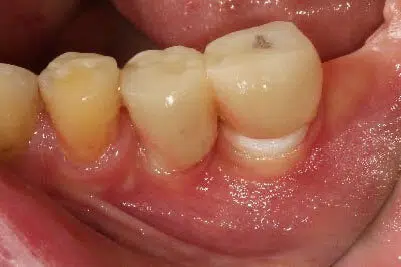Why Do I Have Dental Implant Pain?

Even though dental implants are very successful, they can have problems and fail. Dental implants can become problematic after they are placed and before the tooth crown is put on, this is known as early complications. Dental implants can also have problems after the tooth crown is put on and that is known as late complications. The course of action need to address the pain depends on why you are having pain and diagnosing the problem. This article will focus on factors that can elicit pain post dental implant placement.
Can My Dental Implant Become Infected?
Dental implants can develop gum and bone disease very similar to your natural teeth since the bacteria that damage teeth are the same that damage dental implants. In dental terms it is known as peri-implant mucosisitis or implant gingivitis where the gum tissue around the implant can start to bleed, become red, become swollen, ulcerate, and/or start to pus. Bone can also be affected and start to dissolve around the dental implant and this is known as peri-implantitis or implant bone and gum loss. When this type of infection occurs around your implant you can also develop pain and throbbing in the jaw. Consultation with a periodontist is advised to treat this type of dental implant infection.
The Implant Was Placed to Close to the Nerve
The inferior alveolar nerve (IAN) is a nerve in your lower jaw that provides sensation to your lower teeth and when it branches off towards the front of your chin it becomes the mental nerve which provides sensation to your chin and lip. Everyone’s nerve length and position can be different. If a dental implant is placed too close to these nerves, they can either compress the nerve or traumatize the nerve leading to pain. The first step to take of this happens is to take an x-ray called a cone beam cat scan or CBCT to find out the location of the implant as it relates to the nerve. Depending on what the CBCT says treatment can include steroids and anti-inflammatory medications if the implant is not close to the nerve. Removal of the dental implant should occur if the implant was placed too close or into this nerve.
Can Lack of Gum Tissue Around the Dental Implant Cause Pain?
There are two types of tissue in the mouth. Some tissue is non-keratinized such as the mucosa on the inside cheeks of your mouth and this is a very moveable flexible tissue. The other tissue is called keratinized tissue and this is the harder tissue (similar to your fingernails) and it is a protective tissue that can withstand pressure. In some people there is not enough keratinized strong tissue around the dental implant that may cause them to have pain when performing things like eating, brushing, or any pressure that touches the tissue around the dental implant. In dental terms this is known as a lack of keratinized tissue. Ways to correct this problem would be to see a periodontist and discuss enhancing the tissue around the dental implant with a gum graft.
A Weak Bond Between the Dental Implant and the Bone
When a dental implant is placed into the bone, the bone binds to the surface of the dental implant. The amount and the strength of this bone binding is called bone to implant contact in dental terms or BIC. Even though the bone can appear that it is completely surrounding the dental implant on a standard two-dimensional x-ray, there may be poor bone quality and strength of that binding. If the bone is not bound well to the dental implant, a person can have pain when the implant is used. Many times, the dentist will look at the x-ray and think nothing is wrong since the bone looks normal. There is a machine that uses resonance frequency analysis and can measure the strength of the bone to implant bone giving a digital read out when measuring. If that bond strength is low, the implant may need to be removed.
Predisposing Risk Factors Toward Postoperative Dental Pain
Certain risk factors can exist within the medical/genetic makeup of a person that may predispose you to persistent pain post implant therapy. These risk factors include fibromyalgia, temporomandibular disorders, visceral pain hypersensitivity disorders, chronic pain, depression/anxiety, etc. All of these factors can result in pain with unknown etiology. This type of pain is usually placed under the umbrella of “peripheral painful traumatic trigeminal neuropathy” (PPTTN). A referral to a neurologist or pain specialist is recommended in these cases.
